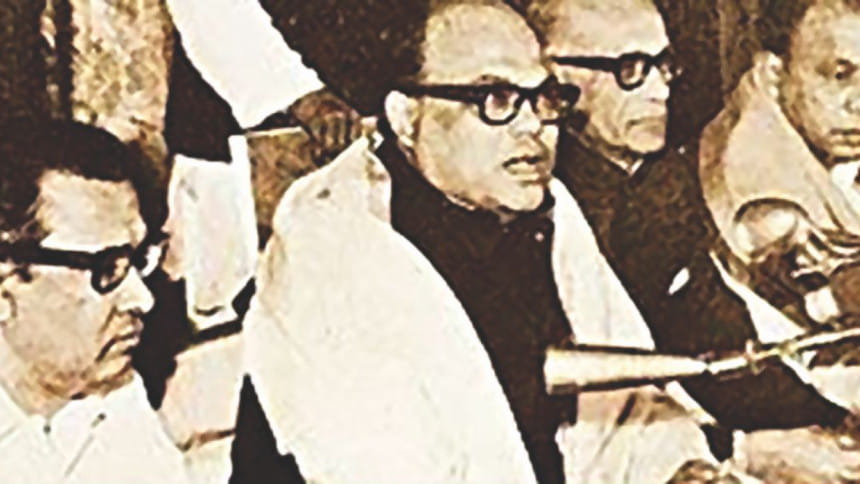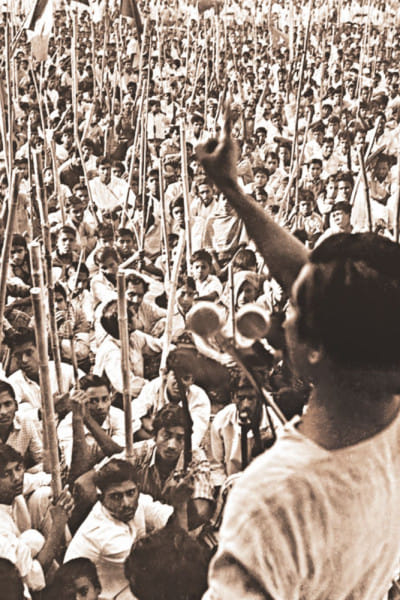The Liberation War and the Provisional Government

In the wake of the crackdown on March 25, the Awami League leaders felt bereft and were left to their devices. Senior leaders fled from their houses to take shelter either in remote villages or in India. Among them was the Awami League General Secretary Tajuddin Ahmed. The Indian authorities gave them safety and shelter. On the evening of April 1, Tajuddin and Barrister Amirul Islam were put aboard a Russian-made Antonov cargo aircraft in extreme secrecy. They were flown from Kolkata to New Delhi. Two days after his arrival in New Delhi, his meeting with Prime Minister Indira Gandhi took place on April 3. It was the first official contact of the Awami League leaders with Indian government more than one week after the crackdown in Dhaka.
He was not only the party general secretary but also the right-hand man of Bangabandhu Sheikh Mujibur Rahman, who was arrested on the fateful night and flown to West Pakistan. Mrs. Gandhi and her aides were apparently impressed with Tajuddin who was adept at explaining the overall situation prevailing in Bangladesh. Before March 25, he was acting on the instructions of Bangabandhu. He apprised Mrs. Gandhi of the freedom movement that had started and said that the people of Bangladesh were determined to continue their struggle until independence was achieved. He sought all-out support from the government of India.
When the people of Bangladesh launched a comprehensive war of liberation, it was the young guerrillas that played a vital role. The freedom fighters, most of them came from rural background and college-university students, put up fierce resistance to the Pakistani Army, who had started killing thousands of innocent people including women and children. The freedom fighters, clad in lungi and shirt, who had no training in guerrilla warfare, blended in with the locals, fought the brutal occupation forces and their Bangladeshi collaborators. The first task of Awami League leaders was to garner support from the government of India. Besides guerrillas, a regular army division was created around the nucleus of the then East Bengal Regiment.
The Bangladesh liberation war was not a secessionist movement but a struggle for total national liberation under the political leadership. April 10 was a red-letter day in the history of Bangladesh. A provisional government-in-exile was formed with Bangabandhu Sheikh Mujibur Rahman as the president and Tajuddin Ahmed as the prime minister of the Peoples Republic of Bangladesh. The proclamation named Syed Nazrul Islam as the vice-president, and explained that if the president, Sheikh Mujibur Rahman, 'is absent, or cannot function or is incapacitated, the vice-president would carry on the functions of the president.' The provisional government was formed to guide and coordinate the war of liberation. The independence proclamation stated that the objective of the government was to ensure equality, human dignity and social justice for the people of Bangladesh.
The six-member war cabinet was formed at a function held at Boidyanathtala Amrakanan in the then Meherpur district. The swearing-in ceremony of the cabinet at Amrakanan on April 17 began with the singing of Rabindranath Tagore's 'Aman sonar Banga ami tomay bhalobashi'- Oh, dear Bengal I love you -- now national anthem of Bangladesh. The exile government was popularly known as Mujibnagar government as Bodyanathtala was named after Bangabandhu. The formation of the provisional government instilled new hope in the minds of the people of Bangladesh. The birth of a new state was witnessed by a 10,000 strong crowd which included contingents of the EPR, Ansar and freedom fighters.
In a statement issued after the inauguration of the exile government, Tajuddin said: 'Bangladesh is at war. It has been given no choice but to secure its right of self-determination through a national liberation struggle against the colonial oppression of West Pakistan.'
Sheikh Mujib believed in parliamentary democracy and took the path of Gandhian non-violence and non-cooperation. His legitimate demand was peaceful transfer of power. He continued to seek a political settlement. Tajuddin said, 'In calling for a programme of non-cooperation on 3rd March, he chose the weapon of peaceful confrontation against the army of occupation as an attempt to bring them to their senses…It is now clear that Yahya and his generals never had the slightest intention of solving Pakistan's political crisis but were only interested in buying time to permit the reinforcement of their military machine within Bangladesh. Yahya's visit to Dhaka for a dialogue was a mere cover for his plan of genocide', he added.
Elaborating Tajuddin said, 'Sheikh Mujib, however, once again opted for the path of political settlement in spite of massive public sentiment for independence. In presenting his four-point proposal for attending the National Assembly he not only had to contain the public mood but to leave a way open for Yahya to explore this last chance for a peaceful settlement.'
Sheikh Mujib's four conditions were: immediate withdrawal of Martial Law; the Army's return to barracks; a judicial inquiry into the loss of life caused by the Army's action; and immediate transfer of power to elected representatives.

Bangladesh had to fight on many fronts, and diplomatic front was one of them. After exhaustive consultation with Tajuddin, the head of Pakistani deputy high commission in Kolkata, Hossein Ali took decision to defect. The diplomats and staff of the mission decided to occupy the Pakistani mission and to hoist Bangladesh flag replacing the Pakistani one. When the flag was being hoisting all staff stood to attention and saluted.
At that juncture, it was essential to have official assurance and diplomatic immunities from the Indian government; otherwise it would not have been possible for deputy high commissioner and his colleagues to defect en masse and open diplomatic mission, first of its kind in any country, in Kolkata. The chief secretary of the West Bengal government assured Ali of all protection and even of 'continuation of diplomatic immunities.' The opening of diplomatic mission in Kolkata in the same building that housed the deputy high commission of Pakistan, was a great blow to the government of Pakistan. Defections of diplomat and staff of the Kolkata deputy high commission were followed by a large number of diplomats in other Pakistani missions. The opening of Bangladesh mission was a great event not only for the expatriate Bangladeshis but also for the Indians. Hossein Ali wrote in his diary:
'There was continuous singing in front of the mission interrupted by speeches. Many came with garlands and I had to accept them. Those were placed near the large photo of Bangabandhu surrounded by photographs of Tagore and Nazrul Islam.'
Led by the Awami League, the liberation war against the Pakistani military junta was also actively participated by other political parties. Sheikh Mujib was in Pakistani custody while Maulana Bhasani took shelter in India. His movements were restricted. There were rumours that Maulana Bhasani was under house-arrest. Rumours were also circulating that certain members of the exile government were secretly negotiating with the Pakistan government for some kind of political settlement. To dispel the confusion, Bhasani on May 3 issued a statement ruling out the possibility of arriving at a political settlement on Bangladesh issue. He said, 'there might be set-back, but our fight against Pakistan would continue, if necessary, for a hundred years. Either we win or we die.' Seventy five million people of Bangladesh, he said, would reject any political settlement arrived at by anyone in Bangladesh or outside.'
Tajuddin on June 3 denied any knowledge of Pakistan approaching the US for intervention for a political settlement of the Bangladesh issue. He, however, made it 'absolutely clear' that there could be no compromise within the framework of Pakistan. 'Bangladesh', he said, 'is sovereign and independent and we shall defend its separate and free entity at any cost.'
In an interview with All India Radio, Tajuddin explained the foreign policy of Bangladesh. Asked what was his government's feeling about the silence or ambivalence of big powers, especially the USA, the United Kingdom and the Soviet Union, Tajuddin replied, "Our friendship for all" policy shall continue to guide our foreign policy irrespective of the variations in the response of world powers to our present difficulties. The government sent emissaries abroad to create favourable lobbies and in organising public opinion in favour of our movement, he added.
Replying to another question, the government in exile's prime minister said pro-Chinese National Awami Party leader Maulana Bhasani and other patriotic leaders and elements have extended their unequivocal support to the struggling people and the Bangladesh government and demanded its recognition by other countries.
The then Soviet Union supported India's stand on demanding immediate release of Sheikh Mujib and an end to the atrocities and genocide being committed against the people of Bangladesh. China accused India of fermenting war and preventing the refugees from returning to their homes in Bangladesh. Most of the countries were either indifferent or unsympathetic to the independence movement, but world media gave wide coverage to atrocities in Bangladesh by the Pakistani military.
The exile government was based on the principle of collective responsibility, but Tajuddin played the vital role. He acted as the spokesman of the people of Bangladesh. But his choice as the prime minister was not unanimous. To run the provisional government, he had to overcome a lot of difficulties and to face many challenges. There were not only differences of opinion among the Awami League leaders, but also groupings and bickering aplenty. Intellectually sound and unassuming, Tajuddin was a coolheaded person. In the absence of Bangabandhu, had he not been chosen as the prime minister of the exile government, it would have been difficult for any Awami League leader to handle the complex situation. He maintained proper liaison with the host Indian authorities as well as various groups and freedom fighters.
India sheltered around ten million refugees including leaders of different political parties. India's supporting role was vital to win independence in a short period of nine months.
Emergence of Bangladesh as an independent state has been one of the greatest events of the twentieth century. Pakistan suffered a humiliating defeat. The freedom-loving people of Bangladesh won independence at a very high cost. The British poet Byron said:
For Freedom's battle once begun,/ Bequeath'd by bleeding sire to son,/ Though baffled oft is ever won.
The writer is a journalist, researcher and columnist.





Comments